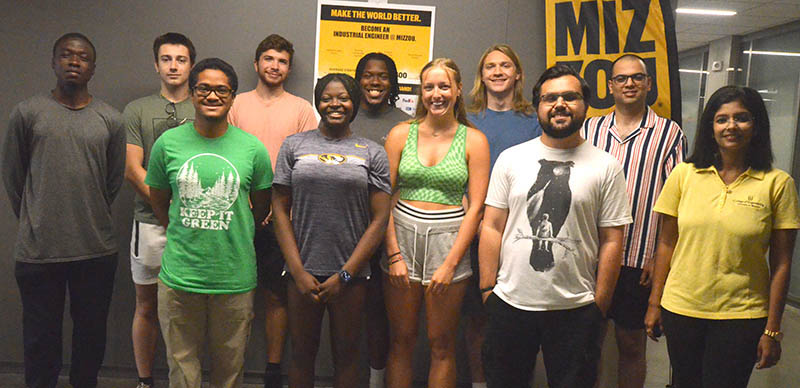July 31, 2023

Ten students spent 10 weeks at Mizzou Engineering this summer learning about artificial intelligence (AI) models and how to best analyze large data sets.
The students were the first to participate in the Research Experiences for Undergraduates Site: Research on Prescriptive Analytics for AI-enabled Operations Engineering. The program is funded by the National Science Foundation and led by Principal Investigator Suchi Rajendran.
“It’s been a great experience, connecting undergraduate students to our research areas so they can help develop models and gain new skills,” Rajendran said.
For some, participating in the program has solidified plans to attend graduate school, with one student even interested in being a graduate mentor for a similar program someday.
“It was interesting seeing the different areas and working with graduate students here,” said Dylan Nojadera, who attends the University of Georgia-Athens. “I would like to do something like that.”
Some of the students presented their findings at the Undergraduate Research Forum on campus last week.
The Projects
Predicting Soybean Yield Utilizing Aerial Imagery
Team: Daniel Grenier, Colorado School of Mines, and Lily Groat, Iowa State University
Grenier and Groat worked on analyzing drone imagery of corn to predict which soil treatments work best to increase yield. They learned about the process of collecting and using information based on photographic information.
“With data analytics and image processing, it’s important to have enough data for prediction modeling,” Grenier said.
And those data sets can take months or years to collect, added Groat, who is an industrial engineering student.
“With industrial engineering, many projects you can complete fairly quickly,” she said. “But with this type of agricultural study, it takes much longer because you have to wait for harvest. It can be challenging and requires patience.”
Zero Trust Systems and Bayesian Network Interactions
Team: Dylan Nojadera, University of Athens, Ben McIntire, Wheaton College, Zachary Bazile, Rutgers
Nojadera, McIntire and Bazile worked with Professor Prasad Calyam on research around zero trust cybersecurity, such as the cybersecurity of drones near war zones.
“You can customize security based on what’s deemed an acceptable level,” Nojadera said. “The main thing I learned from this was how to do proper research.”
Bazile agreed, saying it’s the first time he’s worked on cybersecurity and zero trust models.
“This were new concepts to me,” he said. “I learned a lot.”
McIntire is a computer science student, and the REU has helped him narrow his focus.
“To me, I wanted to do research to get a more topical sense of what I want to study within my major,” he said. “It helped me find direction. I’m definitely interested in cybersecurity.”
Perspective Analytics for AI Enabled Operations Engineering in Medical Facilities and Blood Ordering Policies
Team: Brianna Abam, Mizzou, Aditya Khowal and Emma Lewis
Abam and Khowal worked with Rajendran and her graduate student (Nima Raad) on their methods using multiple factors to optimize blood supply chains.
Abam is a biomedical engineering major at Mizzou Engineering and signed up for the REU to expand her skillsets.
“I wanted to learn more about machine learning,” she said. “I’ve taken a class on it, but wanted to apply it in a practical area.”
For the project, the team used machine learning and optimization to predict blood supply demand and where supplies should be delivered to in order to both meet the need and reduce the amount of donated platelets that gets discarded.
“I used Python, which was a new language for me, and mathematical modeling that I can translate back and apply to my own major,” she said.
Hybrid Minimax Relative Regret Adjusted P-Robust Model for Electric Vehicle Charging Station Location Selection
Team: Abdullahi Ayantayo, Wayne State University, and Carson Swain, Mizzou
Ayantayo and Swain worked with Rajendran and her graduate student (Nima Raad) to study logistics around electric vehicle (EV) charging stations.
“When determining where they should be located, there’s a lot of uncertainty,” Ayantayo said. “I’ve learned that even simple things like determining where charging stations need to be required a lot of thought and planning, and a lot of math.”
Swain, who is a business administration student in the Crosby BBA/MBA Program, applied for the REU because he’s interested in studying supply chains and wanted to delve deeper into data analytics and automation.
“I’ve learned a lot,” he said. “The biggest thing is the structure behind research and research papers, and the efforts behind methodologies. There are a lot of variables to consider.”
Ayantayo said the REU has fueled his interest in learning more about the future of EVs.
“I’m interested in EVs and all that goes into that field,” he said. “It’s something that requires deeper study. I’m now considering graduate school when I wasn’t before.”
Professors Prasad Calyam and Sharan Srinivas are co-PIs of the NSF REU grant.
Work alongside renowned faculty in an interdisciplinary setting. Apply today!